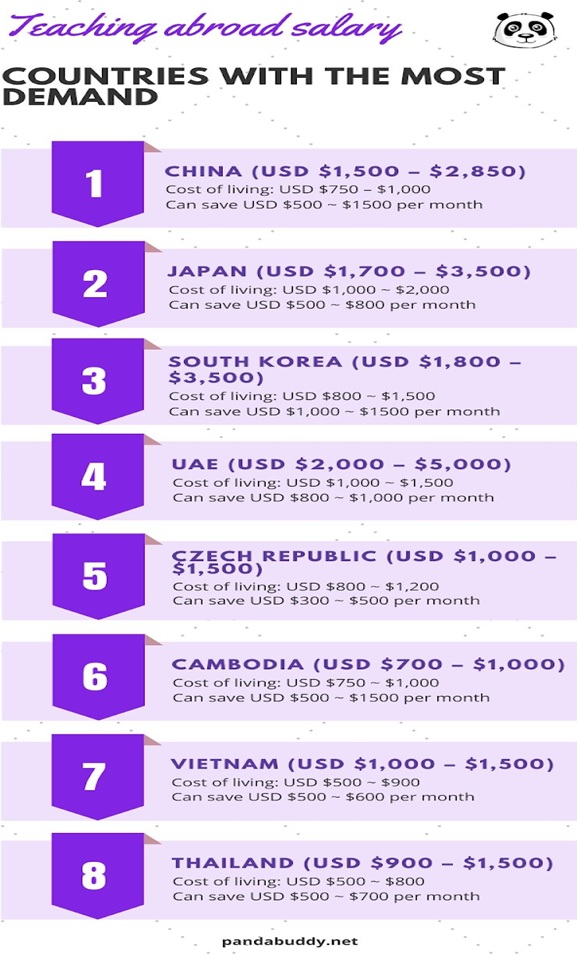Why A Degree Should Not Be A Requirement For Foreign English Teachers In Vietnam?
12th July 2023

From the very early decade, one’s capability of having knowledge has been measured by how many degrees they have acquired. In almost every country, there’s been a constant debate about the topic of what qualification would be sufficient for teaching English and Vietnam is no exception.
Those TEFL teachers who have pursued courses like Online 280-hour International Advanced Diploma in TESOL/TEFL, Vietnam comes to one of the desired destinations to grow their TEFL career. According to pandabuddy.com, Vietnam is one of the desired TEFL destinations for TEFL teachers.

Source: https://pandabuddy.net/teaching-english-abroad-guide/salary/
Recently, in Vietnam, there’s been a huge discussion has started which involves many experts in the educational field Vietnam such as Brian O'Reilly, head of the education & training working group at VBF. These experts have shown concern over the policy in Vietnam that every foreign English teacher needs to have a major degree in the language and wants this requirement to be scrapped.
Let’s get to know about this discussion and how it could benefit the overall education system of Vietnam in the future.
Hey, do you follow us on Social Media? We regularly share upgraded educational content, tips, feedback and more. Check us out by clicking the profiles here - Facebook / Twitter / LinkedIn / Pinterest / Instagram / YouTube
So, without any further ado, let’s get started.
The Current Policy Limitations
At present, a circular in Vietnam stipulates that English teachers must hold an undergraduate degree in the language. While this policy aims to ensure the quality of English education, it may inadvertently exclude experienced teachers who possess teaching certificates but need more specific degree requirements. This limitation can be particularly problematic for teachers from non-English speaking countries who have obtained English teaching certificates to demonstrate their proficiency and expertise in the field.
Brian O'Reilly, the head of the education and training working group at VBF, and Nguyen Kim Dung, a lawyer, and co-head of the group, have voiced their concerns in a petition. They argue that additional language proficiency certificates should not be required for teachers from non-English speaking countries, as their teaching certificates already guarantee their English proficiency.
By changing this requirement, the education system in Vietnam can tap into the potential of experienced teachers who have the necessary qualifications to deliver quality English education.
- Recognized Teaching Certificates
English teaching certificates play a crucial role in determining the proficiency and competence of English teachers. Teachers who hold a world recognized certificates such as Teaching English as a Second Language (TESOL) Certificate accredited by the Awarding Language Acquisition for Professionals (ALAP) organization and the Certificate in Teaching English to Speakers of Other Languages (CELTA) provided by the Cambridge Assessment English are enough to prove that those aspiring teachers have gone through rigorous assessments and capable enough to teach English to non-native English speakers.
- Incompatibility with International Standards
Another issue raised by the experts is the incompatibility of professional qualifications between Vietnam and other countries. The current regulations in Vietnam may prevent foreign English teachers from obtaining and renewing work permits due to the differing requirements. This discrepancy can lead to a potential exodus of teachers seeking more favourable work environments that offer better security and stability.
To ensure a harmonious integration of foreign English teachers into the education system, it is essential for Vietnam to align its professional qualification regulations with international standards. This alignment would not only attract highly qualified teachers from around the world but also promote cultural exchange and diversity within the classroom.
Benefits of Changing the Degree Requirement
Changing the requirement for an undergraduate degree in English for foreign English teachers can bring several benefits to the education system in Vietnam. Let's explore some of the significant advantages this change could offer:
1. Expanded Pool of Qualified Teachers
By recognizing teaching certificates as sufficient qualifications, Vietnam can tap into a larger pool of experienced and qualified English teachers. This expansion of the teacher pool would enhance the overall quality of English education in the country.
2. Promotion of Language Proficiency
Teaching certificates focus on language proficiency and effective teaching methodologies. By prioritizing these qualifications, Vietnam can ensure that English teachers possess the necessary language skills and pedagogical knowledge to deliver high-quality education.
3. Cultural Exchange and Diversity
By attracting teachers from various linguistic and cultural backgrounds, Vietnam can foster a more diverse and inclusive learning environment. This exposure to different cultures can enrich students' language learning experience and promote intercultural understanding.
4. Improved Work Permit Procedures:
Aligning professional qualification regulations with international standards would streamline the work permit procedures for foreign English teachers. This change would attract more qualified teachers and contribute to the overall ease of doing business in Vietnam.
Opportunities Should be Available According To Abilities Not Degree
The requirement for an undergraduate degree in English for foreign English teachers in Vietnam should be reconsidered. The expertise and teaching qualifications obtained through recognized teaching certificates should be recognized as sufficient proof of proficiency.
By changing this policy, Vietnam can tap into a broader pool of qualified teachers who have pursued courses like the Online 280-hour International Advanced Diploma in TESOL/TEFL which will ultimately promote language proficiency, foster cultural exchange, and improve work permit procedures. Embracing these changes would undoubtedly contribute to the overall growth and development of the education system in Vietnam.
Find the right course for you and try out the course. WhatsApp us at +1-213-233-9490. You can also mail us at act@asiancollegeofteachers.com.